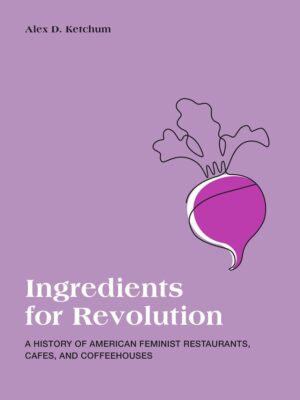“The first step of finding feminists […] is to find where they gathered.” By collecting the voices of feminist restaurateurs and cafe-goers, Ingredients for Revolution: A History of American Feminist Restaurants, Cafes, and Coffeehouses creates a gathering space in its text.
Alex D. Ketchum presents “the first book to study the more than 230 feminist and lesbian-feminist restaurants, cafes, and coffeehouses that existed in the United States,” focusing on activities between the 1970s and 1980s. Interviews and archival materials (such as business records and cookbooks) reveal the practices, politics, and problems of owning and operating a feminist eatery. Ketchum groups restaurants and cafes as brick-and-mortar enterprises, while coffeehouses are identified as temporary spaces that serve refreshments. The first part of Ingredients for Revolution investigates permanent structures, the second part discusses temporary spaces, and the third part brushes on what’s beyond.
Ingredients for Revolution Concordia University Press
A History of American Feminist Restaurants, Cafes, and Coffeehouses
Alex D. Ketchum
$49.95
Paper
9781988111414
An ideological debate at the core of these efforts struck me: can a business, a function of capitalism which will always depend on inequity somewhere along the supply chain, be genuinely feminist? For many of the restaurants, cafés, and coffeehouses included in this study, their primary goal was to initiate a physical site to build community, share art, organize, and socialize without shame. Running a business was sometimes simply a consequence of this endeavour. Most establishments “closed only after a few years… [but] this does not mean they were failures.” They provided economic opportunities for women at a time when it was difficult to obtain a bank loan without a man’s signature on the paperwork. They subverted traditional “women’s work,” interrupted male-dominated restaurant culture, and supplied nourishment as a form of activism.
At the same time, although they employed alternative business practices, these spaces were not feminist utopias. Serving food meant “balancing concerns surrounding [ethically] sourcing products, fairly compensating labour, and offering accessible prices for customers” – not always successfully. Besides a few notable exceptions, permanent businesses were mostly managed by white women who could access capital. Restaurants, cafés, and coffeehouses tended to face homophobia and financial pressure. They often dealt with internal issues of inaccessibility, including racism and transphobia, along with general disagreements among members. These topics and more are categorically examined in each chapter of the book, grounded in the perspectives and artifacts of those who were directly or indirectly involved.
Ingredients for Revolution is an academic work, but Ketchum refrains from employing jargon. She guides readers through case studies with strong, accessible writing (unsurprising, as she also authored Engage in Public Scholarship!: A Guidebook on Feminist and Accessible Communication). Scholarship is supported through extended appendices composed of directories, notes, and references. Photographs and facsimiles of menus, posters, and ephemera are integrated throughout the text. Publishing this knowledge combats erasure while mapping queer and feminist history, both the savoury and unsavoury parts. Ingredients for Revolution is a catalyst for conversations about feminist cafe subculture, contextualizing its past and contributing to its preservation.mRb






0 Comments